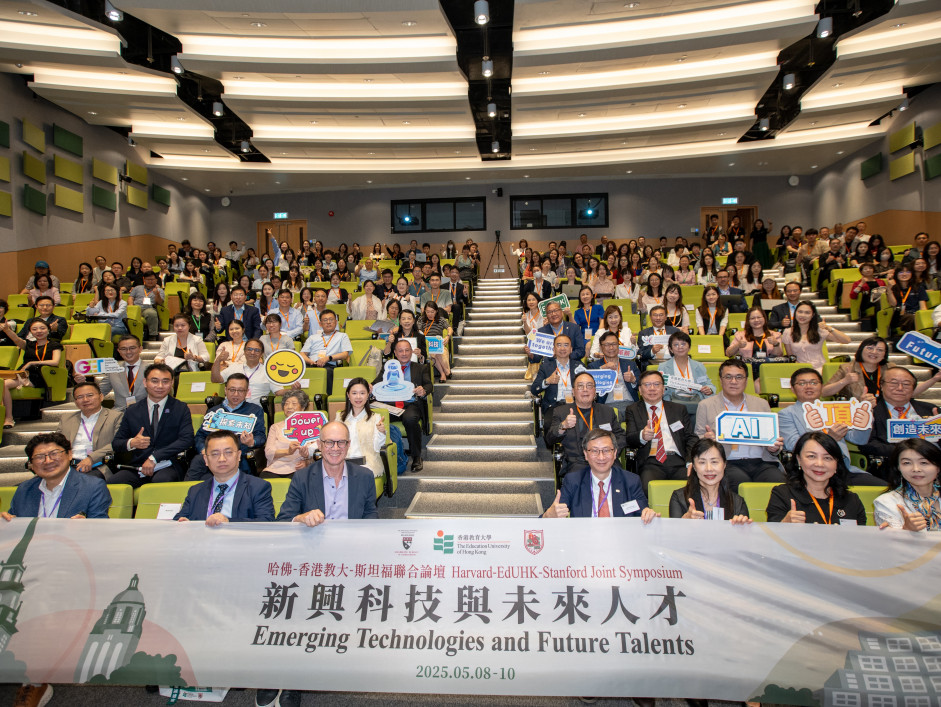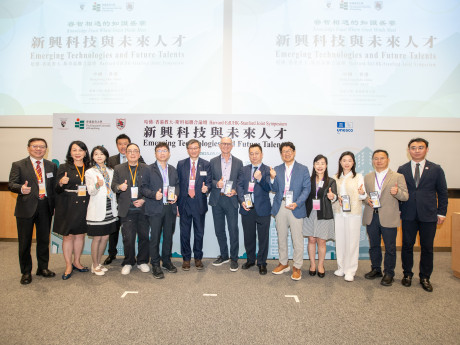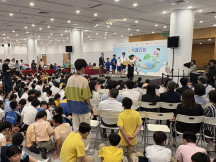Harvard-EdUHK-Stanford Joint Symposium: Emerging Technologies and Future Talents held at EdUHK
The Harvard-EdUHK-Stanford Joint Symposium on Emerging Technologies and Future Talents, jointly organised by representatives from Harvard University, Stanford University and The Education University of Hong Kong (EdUHK), was held at the latter’s Tai Po campus between 8 and 10 May.
The three-day symposium brought together scholars and industry experts from different parts of the world to explore and study the integration and application of emerging technologies such as artificial intelligence, extended reality, machine learning, and the metaverse in teaching, training and talent development, through keynote speeches, parallel sessions, and other formats.
In his opening remarks, Professor John Lee Chi-Kin, President of EdUHK said, “The themes we are exploring in this symposium – Artificial Intelligence, Future Education, and Future Talent – are profoundly interconnected and significant. As we cultivate future talents, our role as educators and scholars extends beyond merely embracing new technologies; we must thoughtfully guide students to develop essential skills such as creativity, critical thinking, ethical judgment and adaptability.”
Mr Yu Changxue, Director of the Chinese and Foreign Cultural Exchange Centre of the Ministry of Education, said in a pre-recorded video, “In this era of deepening globalisation and digitalisation, we need to be open-minded, respect diversity of cultures, and share knowledge. This symposium serves as a vital platform to put this vision into practice.”
Professor John Clifford Mitchell from Stanford University said in his speech, “One of my hopes for the future is that generative AI might bridge this gap between older technology used for education, and newer ways of reaching people that might engage them productively.”
Professor Chris Dede from Harvard University said in a pre-recorded video, “AI and globalisation are causing the need for the future workforce to be prepared in a different way. I'm excited to participate in the Harvard-EdUHK-Stanford Joint Symposium and look forward to discussing these ideas further.”
EdUHK Vice President (Academic) Professor May Cheng May-hung said, “This symposium is more than just a gathering of experts. It is a platform for meaningful exchange, global collaboration and shared vision. It brings together some of the brightest minds in education and technology to explore how innovation can shape the future of learning and leadership.”
EdUHK Vice President (Research and Development) Professor Chetwyn Chan Che-hin said in a written statement, “Over the past three days, we have witnessed vibrant intellectual exchange, deep reflection and global dialogue, that have made this symposium a milestone in our collective effort to shape the future of education.”
The symposium featured a series of captivating keynote speeches delivered by renowned scholars and industry experts. The speakers included Professor John Lee Chi-Kin and Chair Professor Wang Minjuan from EdUHK, Professor John Clifford Mitchell from Stanford University, Professor Yew-Soon Ong from Nanyang Technological University, Professors Li Qing and Li Ping from The Hong Kong Polytechnic University, Dr Paul Kim from the World Bank, and Dr Wang Shijin, Vice President of iFLYTEK Co., Ltd. and Executive Dean of iFLYTEK Research Institute. Professors Chris Dede and Tina Grotzer from Harvard University, and Secretary Ren Youqun from Shandong University presented their keynote speeches online.
The speeches addressed various topics such as Ethics and Values of Artificial Intelligence, Generative AI for Collaborative Learning and Creativity, Latest Developments and Typical Applications of Large Model in Education, Navigating the AI Disruption, the integration of AI into teaching and learning, as well as AI application on higher-education career planning.
The symposium also arranged three innovative workshops: Harvard-Stanford Innovation Education, Writing and Publishing in High-Impact Journals, and Innovation and Entrepreneurship Education in the AI Era. The second workshop was led by Chair Professor of Early Childhood Education Philip Li Hui, assisted by six editors from indexed international journals, who made a rare joint appearance to share their valuable insights on academic writing and publishing from an editorial perspective.
Additionally, the symposium featured thematic panel discussions between academia and industry, poster presentations, and showcases of achievements from researchers, developers, and designers worldwide. Through multiple parallel sessions, participants conducted in-depth discussions on the applications of Al and large language models in STEAM teaching from Kl2 to higher education, the cultivation of creativity and future-oriented thinking, as well as the entrepreneurial ecosystem and talent strategies in the era of AI.
Outstanding research papers shared at the symposium will have an opportunity to be published in extended versions in high-impact academic journals (SCl, SSCI, CSSCl). Outstanding design works are also expected to cooperate with the Global Institute of Emerging Technologies to promote continuous optimisation and the transformation of achievements.
Over 300 principals and teachers from primary and secondary schools, faculty members and students from local and overseas universities, as well as professionals from related industries came to EdUHK from Argentina, Canada, Indonesia, Portugal, Singapore, South Africa, Spain, the United Kingdom, the United States, Macao SAR, Mainland China and Hong Kong SAR to participate in this large-scale academic symposium and exchange event.
Chair Professor Wang Minjuan, the main initiator and chair of the organising committee of this symposium, who recently joined EdUHK from the United States, summarised the event by stating that it was not only a hybrid event combining online and offline participation, but also a "Knowledge Feast where Great Minds Meet". She expressed her hope that this “feast” will accompany everyone in jointly exploring the future of education, emerging technologies and the development of talent.
—Ends—










